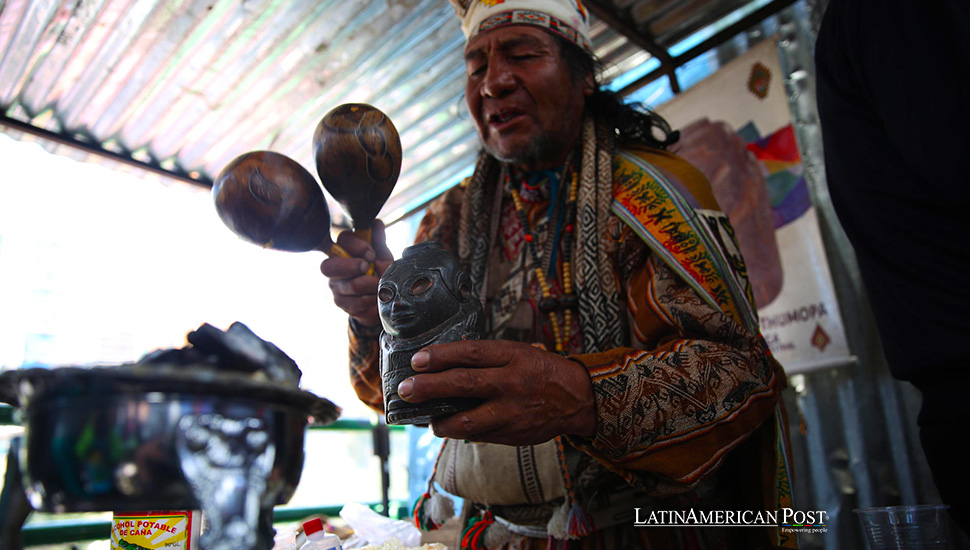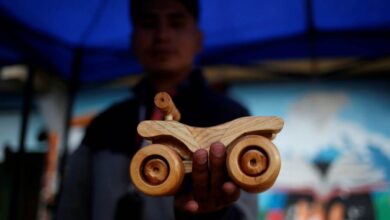Alasita Festival: Bolivia’s Ancient Tradition Meets Modern Aspirations

Blending deep-rooted Andean beliefs with contemporary desires, Bolivia’s UNESCO-recognized Alasita Festival, a cultural tapestry rich in history, began recently with rituals aimed at acquiring wealth, justice, and well-being, reflecting the evolving traditions of an ancient society.
Reviving Tradition: The Alasita Festival in Bolivia
Nestled in the heart of South America, Bolivia revives an age-old tradition with the inauguration of the Alasita Festival. This cultural phenomenon seamlessly intertwines the ancient Andean beliefs with the aspirations of modern life. Declared an Intangible Cultural Heritage of Humanity by UNESCO, the festival, which commenced in the municipality of José Joaquín de Herrera, Guerrero, is a vivid celebration of hopes and dreams manifested through miniature symbols.
Historically, Alasita, which translates to “buy me” in Aymara, dates back to pre-Columbian times and has evolved over centuries, integrating elements from indigenous Andean culture, Spanish colonial influences, and modern societal aspirations. Originally a ritual dedicated to Ekeko, the Aymara god of abundance and prosperity, the festival has transformed to reflect the community’s desires in a tangible form.
Miniatures as Vessels of Hope
On January 24, a date deeply ingrained in the Bolivian cultural calendar, artisans in La Paz and beyond open their stalls, offering miniatures of houses, vehicles, academic degrees, and, in recent years, legal documents symbolizing “won lawsuits.” These items are not mere toys; they are imbued with cultural and spiritual significance. Purchasing these items brings buyers closer to achieving their goals, provided they hold unwavering faith in their power.
Daysi, a participant since childhood, shared with EFE her belief in the transformative power of these miniatures. Her statement encapsulates the festival’s essence – a blend of faith and hope, where material miniatures become vessels of profound personal aspirations.
The festival is more than just the sprawling Parque Urbano Central (PUC) field in La Paz. It spills into various squares across the city, becoming a city-wide celebration. Armed with their newly acquired miniatures, attendees flock to churches and Aymara’s wise men for blessings. These rituals, involving incense, alcohol, sweet wine, and flower petals, are believed to amplify the likelihood of the miniatures’ real-life manifestation.
City-Wide Celebration
This year’s theme of justice and prosperity, embodied in the “won lawsuit” documents, reflects the community’s growing concerns with legal and economic issues. This marks a departure from the festival’s traditional agricultural and household prosperity focus.
At its core, Alasita celebrates Ekeko, the deity synonymous with wealth and abundance. The festival’s centerpiece in La Paz – a statue of Ekeko showered in beer foam, flower petals, and miniature bills – illustrates the enduring faith in this ancient deity. Ekeko, often depicted as a rotund figure laden with goods, symbolizes the hope of abundance and prosperity.
UNESCO’s recognition of Alasita in 2017 as an Intangible Cultural Heritage underscores the festival’s significance as a living tradition, evolving yet retaining its core cultural values. Alasita is a testament to the rich tapestry of Bolivian culture, where pre-Columbian traditions meld with colonial and contemporary influences.
A Living Narrative of Resilience
The festival’s evolution over time reflects the broader narrative of Bolivian society. From its humble origins in indigenous Aymara culture to its adaptation during Spanish colonial rule and eventual resurgence as a symbol of national identity, Alasita embodies the resilience and adaptability of Bolivian traditions.
As Alasita continues to thrive in modern Bolivia, it serves as a reminder of the power of cultural practices in providing hope and a sense of identity. The festival celebrates material aspirations and nurtures a sense of community and belonging, bridging the gap between the ancient and the modern.
Also read: PapJazz Festival: A Melodic Respite Amidst Haiti’s Turmoil
The Alasita Festival is more than just a yearly event; it bridges Bolivia’s past with its present and future. It celebrates the enduring spirit of Andean culture, adapting to the changing times while preserving its core essence. As the festival evolves, it continues to enchant and inspire, reminding us of the timeless power of tradition in an ever-changing world.




